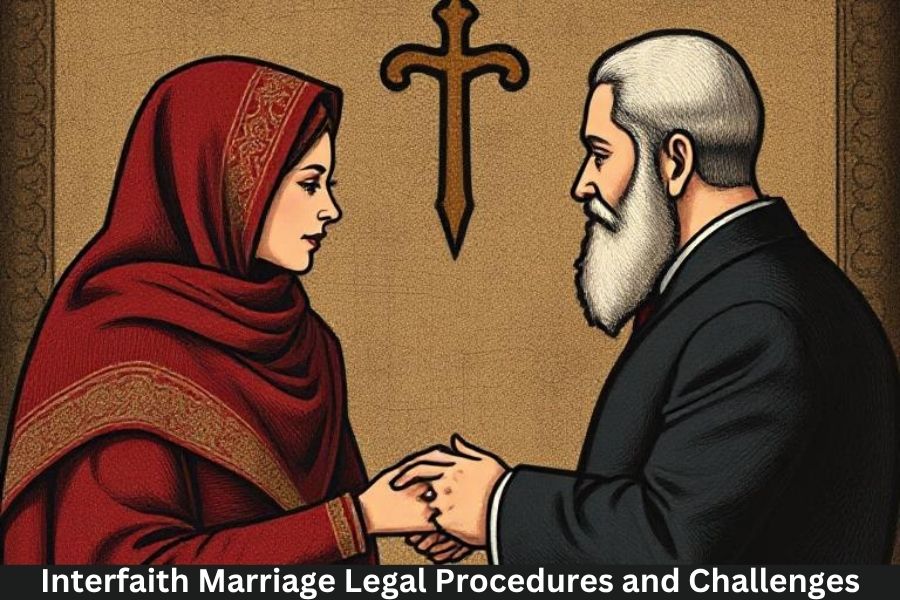Interfaith marriages, where individuals from different religious backgrounds marry, have become increasingly common around the world. While these unions symbolize love and unity across cultures, they also bring a unique set of legal procedures and challenges. Understanding these nuances is crucial for couples who wish to navigate these complexities successfully.
In this article, we’ll explore the legal aspects of interfaith marriages, the challenges they may face, and how they can manage these obstacles while ensuring their rights are respected.
Introduction to Interfaith Marriages
Interfaith marriages involve individuals who follow different religious traditions. These unions can occur across various religions, including Christianity, Islam, Judaism, Hinduism, and others. The concept of interfaith marriage can be viewed differently depending on the country, legal system, and social or religious norms.
The rise of interfaith unions often challenges traditional boundaries set by religious and cultural practices. For some, these marriages are seen as a bridge between communities, but for others, they pose moral or doctrinal dilemmas.
Legal Aspects of Interfaith Marriages
Marriage Laws and Religious Considerations
In most countries, marriage is a civil contract governed by law. However, religious institutions also have their own set of rules and regulations that govern marriages within their faith. This means that an interfaith marriage might be subject to both civil law and religious law. The key legal elements to consider include:
- Marriage Registration: In many countries, interfaith couples must still register their marriage with the state authorities for it to be legally recognized, irrespective of religious ceremonies.
- Religious Ceremonies: Some religious groups might not recognize or bless interfaith marriages, and couples might have to navigate this issue by either having separate ceremonies or seeking the consent of religious leaders.
- Legal Protections: In certain regions, legal protections may not extend equally to all religious groups, especially in cases where one religion is more dominant than the other.
Interfaith Marriage in Different Countries
The legal status of interfaith marriages varies significantly by country. For example:
- In India, interfaith marriages are governed by various personal laws, like the Hindu Marriage Act, Muslim Personal Law, and the Special Marriage Act. Couples marrying under the Special Marriage Act can do so without needing to convert to each other’s religion.
- In the United States, interfaith marriages are legally recognized, but religious groups might have differing views on such unions. There are no legal restrictions, but the couple may face challenges in their personal or family lives.
- In Saudi Arabia and other conservative countries, interfaith marriages may be subject to strict laws, and such unions may not be allowed at all, especially if one partner is non-Muslim.
Religious and Cultural Challenges in Interfaith Marriages
Family Expectations and Social Pressure
One of the most significant challenges faced by interfaith couples is the pressure from family members and society. In many cultures, marriage is seen as a union not just between individuals but also between families and religious communities. Interfaith marriages can be met with disapproval or even hostility from parents and relatives, leading to strained relationships and social isolation.
- Religious Objections: Religious communities may object to interfaith marriages on doctrinal grounds, citing concerns over the faith of children born from the union or the possible weakening of religious identity.
- Cultural Barriers: In some cases, the cultural differences between the religions can create tension, especially when it comes to celebrations, customs, and rites of passage.
Children and Religious Upbringing
Raising children in an interfaith marriage presents its own set of challenges. Deciding which religion, if any, the children will follow can be a sensitive issue. In some cases, religious communities may demand that children be raised according to one religion, while the other partner may want their child to be raised in both traditions.
The question of religious conversion is another hurdle. One partner may want their children to follow their religion, while the other may feel strongly about allowing them to choose their own path.
Legal Challenges in Interfaith Marriages
Inheritance and Property Rights
In some countries, inheritance laws are closely tied to religious identity. For example, in many Islamic countries, inheritance is governed by Sharia law, which can differ significantly from the inheritance laws of other religions. If an interfaith couple owns property together, the division of assets upon death could become a complicated legal issue.
- Discrepancies in Inheritance Law: If one spouse passes away, the surviving partner may find that they are not entitled to the inheritance under the deceased spouse’s religion.
- Property Ownership: Legal complications can also arise around property ownership if local laws prevent the non-religious spouse from owning property or if there are conflicting religious views on property rights.
Divorce and Custody Issues
In cases where the marriage faces difficulties, interfaith couples may encounter complications during divorce proceedings. Many countries apply religious laws to divorce cases, which can lead to disparities in outcomes for the couple. Issues such as:
- Custody of Children: Custody battles may be complicated by differing views on how children should be raised. The religious background of each parent can affect the custody decision in some jurisdictions.
- Alimony and Maintenance: Alimony and maintenance payments can also be influenced by religious laws, making divorce proceedings in interfaith marriages particularly complicated.
How to Overcome Challenges in Interfaith Marriages
Open Communication
Communication is the key to navigating the challenges of an interfaith marriage. Openly discussing your values, beliefs, and the way you want to approach religion, children, and family traditions can help avoid misunderstandings later on. It’s important to:
- Understand Each Other’s Beliefs: Having an understanding of each other’s religious background can help in finding common ground.
- Set Boundaries Early: Clarify from the beginning how you want to handle major issues such as religious celebrations, holidays, and the raising of children.
Seek Legal Advice
In some cases, it may be necessary to seek legal advice, particularly when it comes to inheritance rights, custody laws, or religious ceremonies. A lawyer familiar with interfaith marriages can help couples understand their rights and responsibilities in their specific country.
Respect for Diversity
The key to a successful interfaith marriage often lies in respecting each other’s differences and finding a balance between the two religions. Many couples find that blending traditions and celebrating both religious customs can enrich their relationship and their children’s upbringing.
Conclusion
Interfaith marriages come with both unique opportunities and challenges. While they can foster a deep understanding and respect between different cultures and religions, they also bring with them legal, social, and familial hurdles. By understanding the legal procedures involved and addressing the religious and cultural challenges with respect, communication, and openness, interfaith couples can build strong, lasting unions.



